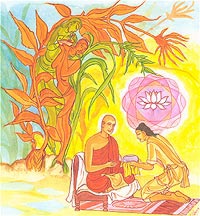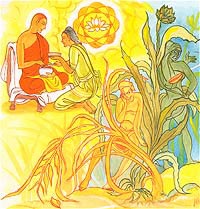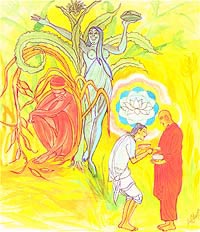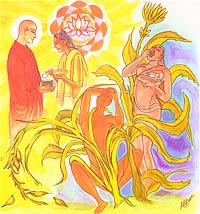23912 Sunday LESSON 708 FREE ONLINE eNālāndā Research and Practice UNIVERSITY through http://sarvajan.ambedkar.org Dhammapada Verses 356, 357, 358 and 359 Ankura Vatthu-Verse 356. Those Without The Bane Of Passion-Verse 357. Those Without The Bane Of Ill-Will-Verse 358. Those Without The Bane Of Illusion-Verse 359. Those Without The Bane Of Greed
 |
Verse 356. Those Without The Bane Of Passion
Explanation: Fields have grasses as their bane. The ordinary |
 |
Verse 357. Those Without The Bane Of Ill-Will
Explanation: Fields have weeds as their bane. The ordinary |
 |
Verse 358. Those Without The Bane Of Illusion
Explanation: Fields have weeds as their bane. |
 |
Verse 359. Those Without The Bane Of Greed
Explanation: Fields have weeds as their bane. |
Dhammapada Verses 356, 357, 358 and 359
Ankura VatthuTinadosani khettani
ragadosa ayam paja
tasma hi vitaragesu
dinnam hoti mahapphalam.Tinadosani khettani
dosadosa ayam paja
tasma hi vitadosesu
dinnam hoti mahapphalam.Tinadosani khettani
mohadosa ayam paja
tasma hi vitamohesu
dinnam hoti mahapphalam.Tinadosani khettani
icchadosa ayam paja
tasma hi vigaticchesu
dinnam hoti mahapphalam.Verse 356: Weeds damage fields; lust spoils all beings. Therefore, giving to
those free from lust yields great benefit.Verse 357: Weeds damage fields; ill will spoils all beings. Therefore, giving
to those free from ill will yields great benefit.Verse 358: Weeds damage fields; ignorance spoils all beings. Therefore,
giving to those free from ignorance yields great benefit.Verse 359: Weeds damage fields; covetousness spoils all beings. Therefore,
giving to those free from covetousness yields great benefit.
The Story of Deva Ankura
While on a visit to the Tavatimsa deva realm, the Buddha uttered Verses (356)
to (359) of this book, with reference to a deva named Ankura.The Buddha visited the Tavatimsa deva realm to expound the Abhidhamma to Deva
Santusita, who had been his mother. During that time, there was a deva named
Indaka in Tavatimsa. Indaka, in his last existence as a man, had offered a
little alms-food to Thera Anuruddha. As this good deed was made to a thera
within the period of the Buddha’s Teaching he was amply rewarded for it. Thus,
on his death he was reborn in the Tavatimsa realm and was lavishly bestowed with
the luxuries of the deva world. At that time, there was also another deva by the
name of Ankura in Tavatimsa who had given much in charity; in fact, many times
more than what Indaka had given. But his charity was made outside the period of
the Teaching of any of the Buddhas. So, in spite of his lavish and grand
charities, he was enjoying the benefits of the life of a deva on a much smaller
scale than Indaka, who had offered very little. As the Buddha was then at
Tavatimsa, Ankura asked him the reason for the discrepancy in gaining the
benefits. To him the Buddha answered, “O deva! When giving charities
and donations you should choose whom you give, for acts of charities are just
like seeds. Seeds put into fertile soil will grow into strong, vigorous plants
or trees and will bear much fruit; but you had sown your seed in poor soil, so
you reap poorly.”Then the Buddha spoke in verse as follows:
Verse 356: Weeds damage fields; lust spoils all
beings. Therefore, giving to those free from lust yields great
benefit.Verse 357: Weeds damage fields; ill will spoils
all beings. Therefore, giving to those free from ill will yields great
benefit.Verse 358: Weeds damage fields; ignorance spoils
all beings. Therefore, giving to those free from ignorance yields
great benefit.Verse 359: Weeds damage fields; covetousness
spoils all beings. Therefore, giving to those free from covetousness
yields great benefit.
End of Chapter Twenty-four: Craving